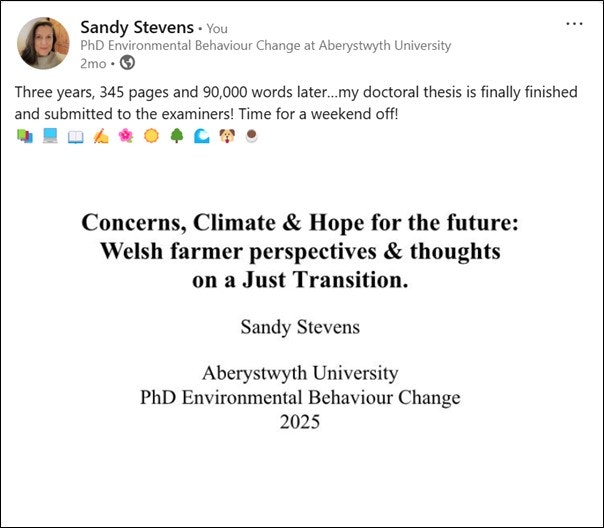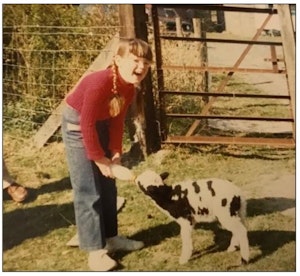CAT Conversations: Sandy Stevens, CAT graduate
April 17, 2025Home » CAT Conversations: Sandy Stevens, CAT graduate
CAT graduate Sandy Stevens graduated with a distinction in our MSc in Sustainability and Behaviour Change in 2021. After four years of hard work and dedication she recently completed a PhD at Aberystwyth University. We caught up with her to find out more…
Hi Sandy, congratulations on completing your PhD! Before we hear more about it, can you tell us about the journey that inspired you to undertake the PhD after studying at CAT?
I was really impressed by CAT’s work after I attended the first Zero Carbon Britain course in May 2019 which was shortly after the shocking IPCC’s 2018 announcements about the need to limit global warming to 1.5C. This all provoked a real paradigm shift for me, and after becoming involved in climate action in my local community, I saw the need to be better informed around issues on climate. Through joining the Zero Carbon Britain course and attending the following CAT conference, I found out about the Graduate School!
I’m a languages person and certainly NOT from a science background at all so it was a welcome surprise to discover that CAT’s Masters programmes are accessible for all, and you don’t need a background in climate science to join them. I signed up for a Graduate School open day the following month!
During my postgraduate studies in Sustainability and Behaviour Change at CAT, I discovered a real passion for the world of research, hence my decision to do a PhD. The rest is history!
So, can you tell us a bit about what your PhD at Aberystwyth University covered?
My PhD is titled ‘Concerns, Climate and Hope for the future: Welsh farmer perspectives and thoughts on a just transition” and investigates Welsh farmers’ views on climate issues and a just transition. Using behavioural science informed research, I explored the level of knowledge that farmers hold on these issues, what their concerns are, and what aspects award them a sense of hope for the future of Welsh farming.
What inspired you to explore this topic?
While not from a farming background myself, what I have come to learn is that Welsh farmers’ local knowledge is of great value, as are perspectives on the challenges they face and their hopes for the future. Farmers can shape a future involving fundamental transitions to sustainable methods: they are regional actors and not simply observers of their fate. Therefore, understanding their views and knowledge on these aspects is paramount. My PhD research, therefore, communicates this knowledge and understanding and brings their voices to the fore. I feel this is particularly important at the current time, especially in view of numerous Welsh farmers protests over the last year or so, where some farmers have expressed the view that their voices aren’t being heard.

What advice would you give to anyone wanting to communicate with others about behaviour change and working towards a just transition?
A quote from guest lecturer Caroline Hickman, a climate psychologist who gave us an excellent talk on one of our Behaviour Change modules, was for me, a real wake-up call.
“Don’t talk to me about Climate Change…I can barely put food on the table!”
It was a much-needed reminder that some people are facing challenges that prevent them from even having the head space to consider the climate crisis. We all have our struggles, biases and individual mindsets, and this is always an important point to consider when seeking to engage others.
What behaviour changes do you feel we need to see in the near future?
Hmm that’s an interesting one. I think that understanding people’s fundamental needs is key in climate adaptation, because then it might be possible to address those needs by presenting them with the opportunities that the climate adaptation space offers. Secondly, and related to the first point, I guess I’d say that shifting behaviour isn’t simply about giving people information to convince them to do something (in fact research shows that this does not necessarily change behaviour). Instead, it has a lot to do with understanding what people’s values are, what gives them a sense of identity (among other aspects) and this in turn can influence attitudes which in turn can determine the intention to act on something.
What skills from your MSc at CAT did you take into your PhD?
The MSc programme really taught me the importance of having a solid study ethic and so, following a successful MSc Dissertation thanks to some very insightful CAT tutors, I had the confidence to face the challenge of a doctoral thesis. They gave me the confidence to further pursue a career in research and taught me a healthy research ethic in terms of good practice.
And finally, do you have any advice for anyone thinking of studying on our MSc in Sustainability and Behaviour Change?
I would say “Go for it!!”. I think the whole experience of studying at the CAT Graduate school was truly transformative, for me personally. The lectures were of an excellent standard, with consistent help & support from staff and admin.
I would also say that another particularly valuable aspect was the conversations over coffee and the many light bulbs moments in between lectures. It was those conversations about the need to hear from farmers in Wales, within the climate space, that inspired my PhD research with Welsh farmers (in fact these discussions harked back to my own rural connections on a family friend’s farm as a child, which can be seen in the photo below). The whole CAT experience led to some profound insights. So, I guess I’d say, “What are you waiting for?!”

Study at CAT
Inspired by Sandy’s story? Find out more about our MSc in Sustainability and Behaviour Change or other postgraduate courses at CAT on one of our next Graduate School open days or get in touch with our Admissions Team by emailing study@cat.org.uk or phoning 01654 705974.
- Graduate School
- Climate Change
- Nature and Wildlife
- News Feed
Related Topics
Related Pages
EMAIL SIGN UP
Keep up to date with all the latest activities, events and online resources by signing up to our emails and following us on social media. And if you'd like to get involved and support our work, we'd love to welcome you as a CAT member.
